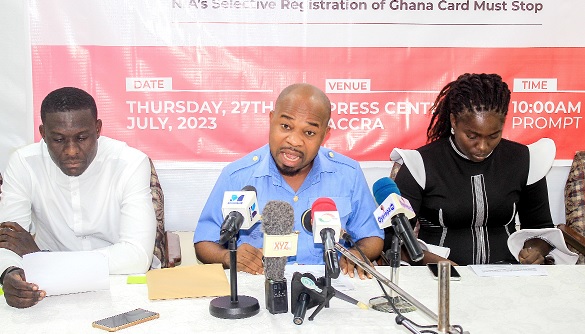A group called Coalition of Ghanaians without Ghana Card has described the insistence of the Electoral Commission to use the card being issued by the National Identification Authority (NIA) as the sole document for voter registration in the 2024 general election as unfair.
They said acquisition of the card was beset with challenges, hence using it as the sole document for voter registration would deny many citizens the opportunity to exercise their right to vote.
The convener of the coalition, Richard Kasu, said: “As a coalition championing participatory governance, we cannot sit unconcerned for any qualified citizen to be disenfranchised in any public election.
“Citizens must resist the oppressors rule to administer injustice by using the card as the sole sourced document for registration of voters,” he added.
Mr Kasu also said that the coalition was aware of an ongoing Ghana card premium registration exercise at some designated centres in the country.
“The premium registration exercise at the commercial value of GH¢280 should be stopped immediately due to the prevailing economic challenges in the country.
“We consider the commercialisation of the acquisition of the Ghana card as selective, and a tool to marginalise majority of the public from its national use and benefit thereof,” he said.
Mr Kasu further expressed concern about the fact that citizens who made the effort to move to regional offices of the NIA to register were given various excuses such as the unavailability of cards and network challenges, among other bottlenecks by officials.
The coalition, therefore, entreated the government and the NIA to ensure that the public accesses the card through a nationwide mass registration exercise at the district and regional levels in order that nobody would be disenfranchised in the 2024 election through no fault of theirs.
They also called for an inclusive stakeholder discussion by the NIA to fashion out a way to make its services more progressive, accessible and affordable to the public.
“The 12,000 members of the coalition are concerned about next year’s general election where members without the card might not vote.
“This would be an infringement on their fundamental rights to vote as guaranteed under the 1992 Constitution,” Mr Kasu added.
He said the coalition was an interventionist national advocacy group consisting of citizens, civil society organisations (CSOs) and public interest groups, among others.












